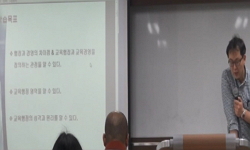This study set out to examine the patterns of multicultural experiences depicted in Lee Shim, A Joseon Court Lady in Paris by Kim Tak-hwan according to the character characteristics. In the study, multicultural experiences signify the patterns of shoc...
http://chineseinput.net/에서 pinyin(병음)방식으로 중국어를 변환할 수 있습니다.
변환된 중국어를 복사하여 사용하시면 됩니다.
- 中文 을 입력하시려면 zhongwen을 입력하시고 space를누르시면됩니다.
- 北京 을 입력하시려면 beijing을 입력하시고 space를 누르시면 됩니다.

자유주제 : 동아시아 근대의 다문화적 체험과 팩션 -김탁환의 「파리의 조선 궁녀 리심」을 중심으로- = Multicultural Experiences and Faction in Early Modern East Asia -With a focus on Lee Shim, A Joseon Court Lady in Paris by Kim Tak-Hwan-
한글로보기https://www.riss.kr/link?id=A82492824
- 저자
- 발행기관
- 학술지명
- 권호사항
-
발행연도
2010
-
작성언어
-
-
주제어
다문화적 체험 ; 제국주의 ; 팩션 ; 국가 만들기 ; 정체성 ; 시선 ; 생명존중 ; 교육 ; 구도 ; multicultural experiences ; imperialism ; East Asia ; faction ; Lee Shim ; Kim Tak-hwan ; making a nation ; identity ; perspective ; care of people
-
KDC
800
-
등재정보
KCI등재
-
자료형태
학술저널
-
수록면
257-286(30쪽)
- DOI식별코드
- 제공처
- 소장기관
-
0
상세조회 -
0
다운로드
부가정보
다국어 초록 (Multilingual Abstract)
This study set out to examine the patterns of multicultural experiences depicted in Lee Shim, A Joseon Court Lady in Paris by Kim Tak-hwan according to the character characteristics. In the study, multicultural experiences signify the patterns of shock, response, and acceptance created by the encounter of heterogeneous cultures. The reason the study focused on early modern times or Enlightenment Period is that it preoccupied the time period right before modern times that entered the age of multiculture. The patterns of characters` responses during the Enlightenment Period correspond to the flow of imperialism that ruled the world those days. The warlike nature of imperialism was threatening to the people of weak countries along the border areas of East Asia. It is also important for full-scale study to understand the meaning of faction that calls historical figures of oblivion into contemporary times because the work presents the narrative of a court lady alienated from history rather than that of a historic, heroic figure. The responses of the characters correspond to the characteristics of upper-class, borderline, and lower-class characters. The upper class includes the rulers and leaders of the Enlightenment Period such as the Queen(Empress Myeongseong), King Gojong, Kim Ok-gyun, and Hong Jong-woo. They accept new cultures and civilizations and focus on their determination of making a nation. In the work, Lee Shim is a borderline character. Starting with a humble beginning, she moves upward to the status of court dancer and wife of the invited French diplomatic minister. She is the first Korean woman that stayed in Europe. The cultural shocks she experienced in Paris and Tanger are significant, preoccupying today`s multicultural experiences. Although she is repeated aware of her status as an alien or a citizen of an inferior country whenever she is put in a new place or encounters with a new culture, she paradoxically expands her identity and perspective. However, her suicide shows that a weak woman from a border area was a Pharmakos figure in the Enlightenment Period when imperialism was prevalent. Finally, the responses demonstrated by the lower-class characters seek out people more realistically than the leaders. They actually take care of people when the leaders are busy with making a nation.
동일학술지(권/호) 다른 논문
-
자유주제 : 김수영 시에 나타난 욕망에 대한 연구 -욕망의 억압과 분리를 중심으로-
- 한국현대문예비평학회
- 김석환 ( Seok Hwan Kim )
- 2010
- KCI등재
-
- 한국현대문예비평학회
- 곽효환 ( Hyo Hwan Kwak )
- 2010
- KCI등재
-
- 한국현대문예비평학회
- 송영순 ( Young Soon Song )
- 2010
- KCI등재
-
자유주제 : 시대에 대응하는 전략적 방식으로써 되받아 쓰기(writing back) 고찰 -고정희 『초혼제』(1983) 장시를 중심으로-
- 한국현대문예비평학회
- 박송이 ( Song Yi Park )
- 2010
- KCI등재




 KCI
KCI KISS
KISS







